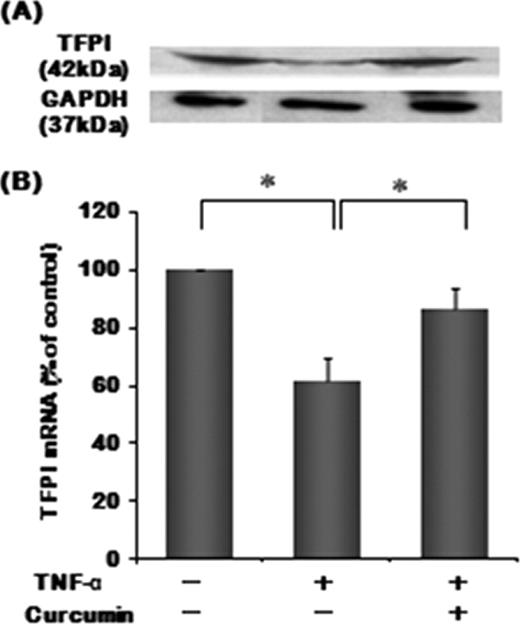Abstract
Abstract 1202
Curcumin (diferuloyl methane), an active component of the spice turmeric, has been shown to exhibit anti-inflammatory and antioxidant activities in addition to an anticartinogenic activity in vitro and in vivo. Furthermore, we reported that curcumin inhibited the induction of tissue factor (TF) expression in human umbilical vein endothelial cells (HUVECs) at 52nd ASH 2010. Therefore, curcumin may ameliorate hyper-coagulable state associated with inflammation or oxidative stress. On the other hand, tissue factor pathway inhibitor (TFPI) which is expressed by endothelial cells plays a crucial role in hemostasis by regulating TF-induced initiation of coagulation. This study examined whether curcumin modulates the expression of TFPI in HUVECs. Methods: HUVECs were pretreated with curcumin at the concentration of 20 μM for 3h, washed and stimulated with tumor necrosis factor-alpha (TNF-alpha, 10 ng/ml) for additional 12 or 24h. The mRNA and protein levels of TFPI in the cultured HUVECs were determined by reverse transcriptase polymerase chain reaction (RT-PCR) and western blotting, respectively. To determine whether curcumin affects the MAPK signaling pathways, the phosphorylation of p38 mitogen-activated protein kinase (p38MAPK), extracellular signal-regulated kinase1/2 (ERK1/2) and c-Jun N-terminal kinase (JNK) in the HUVECs were analyzed with western blotting. Additionally, to determine whether curcumin affects nuclear factor-kappa B (NF-kB) pathway, nuclear and cytoplasmic fractions were extracted and protein levels were determined by western blotting for NF-kB (p65), p-IkB and IkB. Results: After TNF-alpha stimulation, TFPI mRNA levels were approximately decreased by 40% compared to the control (p<0.05; Figure 1B). Similarly to the mRNA expression, TFPI protein levels were decreased (Figure 1A). On the other hand, pretreatment of HUVECs with curcumin significantly suppresses TNF-alpha-induced TFPI mRNA and protein down-regulation (p<0.05; Figure 1A, B). Curcumin inhibited TNF-alpha-induced activation of p38MAPK, ERK1/2, and JNK. Moreover, curcumin inhibits TNF-alpha-induced IkB activation in HUVECs. And, translocation of NF-kB from the cytosol into the nucleus by TNF-alpha was inhibited by curcumin. Conclusions: These results indicate that curcumin may suppress the TNF-alpha-induced TFPI down-regulation via NF-kB pathways. Thus, curcumin may offer a novel antithrombotic option for treatment of the hypercoagulable state associated with inflammation.
Effects of curcumin on TNF-alpha-mediated TFPI protein (A) and mRNA (B) expression in HUVECs. The columns represent the mean ± SD (n=3) percentages of the control culture. *p<0.05
Effects of curcumin on TNF-alpha-mediated TFPI protein (A) and mRNA (B) expression in HUVECs. The columns represent the mean ± SD (n=3) percentages of the control culture. *p<0.05
No relevant conflicts of interest to declare.
Author notes
Asterisk with author names denotes non-ASH members.


This feature is available to Subscribers Only
Sign In or Create an Account Close Modal